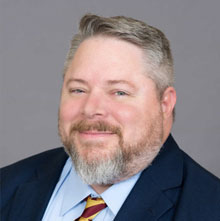
Eric Holt
Each week, Daniels is featuring a researcher who conducts meaningful research that impacts their field and the wider community. Learn more about their work in Q&As with the Daniels Research team and email them to nominate yourself or a colleague for a future Q&A.
Eric Holt is an assistant professor in the Burns School of Real Estate and Construction Management at the Daniels College of Business. He teaches Construction Building Systems, Architectural Planning and Design Management, and Construction Estimating. He is also the faculty advisor/coach for the NAHB, ASC and Hack-A-House Student Competition Teams.
Eric has 28 years of industry experience, from construction building materials sales, building inspection and permit review, construction project management, to architectural design and construction consulting.
What do you research and why?
Right now, I’m looking at the affordability of residential construction: Why aren’t homes affordable anymore? How can we build differently? Better? Faster? Less Expensive? We’re looking at this from two angles: First is trying to answer housing affordability through labor. We’re working on a study with the Home Builders Institute right now to try to correlate labor shortages with affordability. I’m also chasing some other grants that would give us the ability to study workforce development, the lack of labor, why so many folks left the industry, and how that phenomenon is driving up prices in both material and process. The other piece we’re looking at is how technology is influencing affordability, like off-site construction and carbon accounting. We have another project with Thrive Home Building, which is trying to build carbon-neutral housing, where we are figuring out how they document that carbon neutrality, how they calculate it, etc.
How do you involve your students in your research?
Students are really interested in housing right now because it directly affects them. The entry-level housing that I had access to in my twenties doesn’t necessarily exist for this generation. So the students’ interest level is driven in two ways: one, because it affects their futures as homeowners and, two, because studying things like off-site construction and carbon accounting is what is going to help get them hired. The research we’re doing tackles the latest and greatest problems of industry. In academia, we call it research; the industry calls it problem-solving. So, by integrating research and industry into the classroom, we are illustrating industry problems and potential solutions for students to consider. I try to create a lot of opportunities for students. In research projects, I always build in funding for student research assistants. If a grad student doesn’t know exactly what streams of research they want to pursue yet, I have a whole list of pet projects that I can direct them to. I’m also the faculty coach for the National Association of Home Builders’ student competition, and I work with students on Ivory Innovations’ Hack-A-House competition. From a curriculum perspective, we are working with MiTek to develop an off-site construction curriculum for four-year programs.
If it’s housing-related, I’m trying to be there from both a service and a teaching aspect.
What methods do you use in your research?
It depends on the project. For the labor study we’re doing with the HBI and Fannie Mae, no data exists. So we’re conducting qualitative interviews to get some baselines so that we may come up with some quantitative survey metrics and an index that they can work from every year. A lot of homebuilders are good at collecting data, but very poor at analyzing it or sharing it, particularly with industry groups. As a university though, we are more likely to be able to gain access to it when we ask. So our studies really depend on the target audience. If it isn’t an industry problem or if someone in industry isn’t asking the question, then there is no point in me asking the question or studying it.
How would you like to see your work impact the marketplace?
The fast pace of change in the industry makes it a challenge. You can spend a long time studying a system or some aspect of the industry, but by the time the paper has been published, the system or technology you were studying may have become obsolete. Getting certain grants, on the other hand, the work that comes out of those can have a direct impact on industry, the local economy and policymakers. It’s hard to say what our impact really looks like, but I’d like for our research to change the world.
